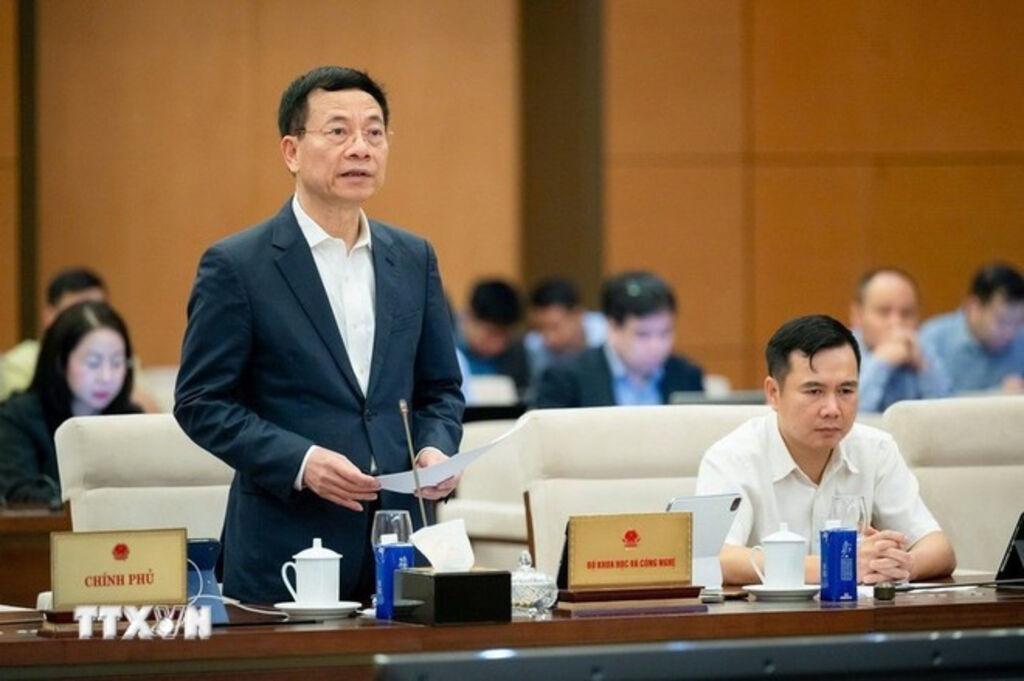 |
| Minister of Science and Technology Nguyen Manh Hung__Photo: VNA |
The draft Law on Artificial Intelligence, the first of its kind in Vietnam which is being discussed at the 15th National Assembly’s 10th session, is expected to help establish a legal foundation to promote the research, development, application, and governance of AI in a safe, responsible, and human-centered manner, once it is approved.
Vietnam has identified AI as a national priority technology, playing a key role in digital transformation, the development of a knowledge-based economy, and the enhancement of national competitiveness.
The Politburo’s Resolution No. 57-NQ/TW on breakthroughs in science, technology, innovation, and national digital transformation sets the goal for Vietnam to be among the top three countries in Southeast Asia in AI research and development; gradually master several strategic and digital technologies, including AI; and strongly promote AI applications based on big data across key sectors and fields.
The draft Law on Artificial Intelligence consists of eight chapters and 36 articles, aiming to institutionalize the Party and State policies, create a breakthrough legal framework for AI, and establish a favorable legal environment to promote innovation and enhance national competitiveness. At the same time, it seeks to manage risks and safeguard national interests, human rights, and digital sovereignty.
The bill ensures the institutionalization of the orientations and policies identified in Party and State documents and resolutions. It is designed as a framework law, flexible and adaptable to technological development, while providing systematic and comprehensive regulations to balance governance with the promotion of AI research, development, deployment, and application in Vietnam.
The draft law places humans at the center, with the overarching principle that AI must serve humans, not replace them. Humans must oversee AI in critical decision-making processes, and AI systems must be transparent, accountable, and safe.
According to Minister of Science and Technology Nguyen Manh Hung, the draft law inherits and abolishes existing AI-related provisions in the Law on Digital Technology Industry, while adding legal “gaps” that need to be filled to perfect the AI regulatory framework. In addition, it selectively incorporates laws and practical experience from the AI development trends of several countries, ensuring alignment with Vietnam’s actual conditions as well as with the laws and international treaties to which Vietnam is a party.
Assessing the AI application in Vietnam, Tran Vu Ha Minh, Chief Advisor for Responsible AI at FPT Software, stated that AI in Vietnam is developing rapidly but not yet synchronously. Implementation still faces many challenges due to shortages of highly specialized personnel in technology, law, and AI ethics. As Vietnam is still in the early stages, it has a “golden opportunity” to build an AI system that adheres to high standards from the very beginning.
Given that nearly 170,000 Vietnamese enterprises are currently applying AI, accounting for about 18 percent of all businesses, and the chatbot market is forecast to grow sixfold over the next decade, Minh advised the Government to issue detailed guidelines for responsible AI deployment, starting with widely used tools such as chatbots and virtual assistants.
Offering specific recommendations for the draft law, the expert proposed clarifying the responsibilities of developers within the AI supply chain, rather than only regulating providers or importers; and allowing third-party assessments recognized domestically or internationally.- (VNA/VLLF)









